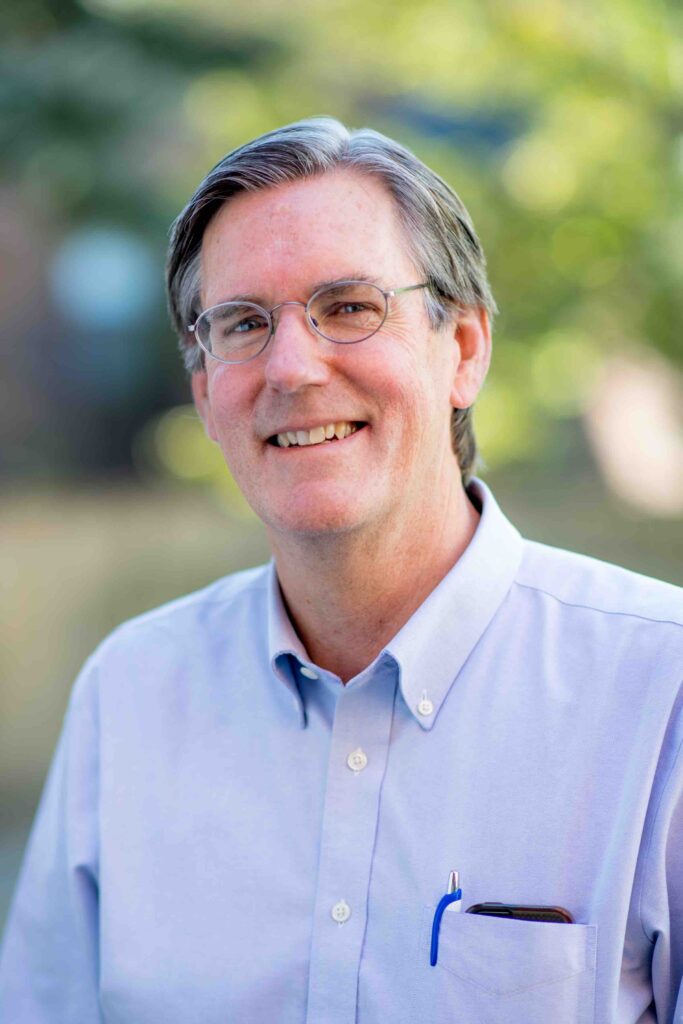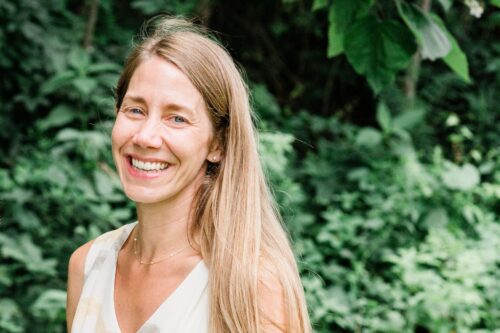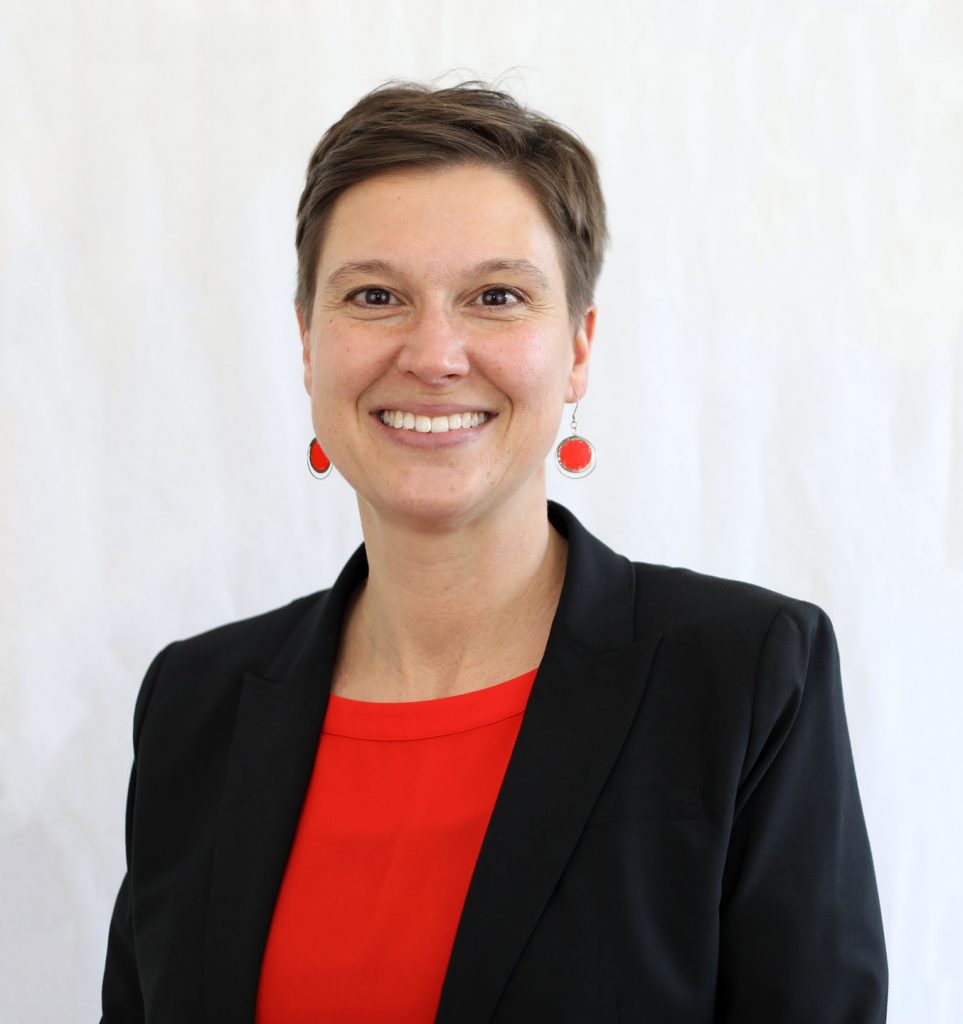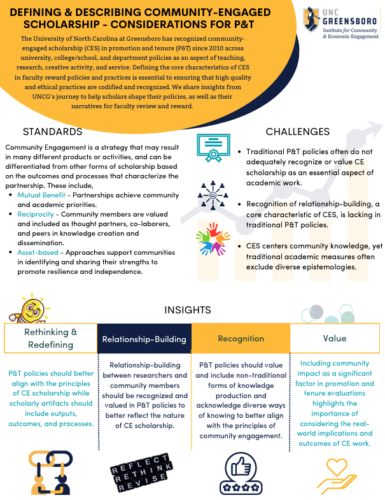Promotion and Tenure Policy – Institutional Case Study
This research team examines policy changes that occurred at the University of North Carolina at Greensboro (UNCG) between 2009 and 2017, with special focus on the years between 2010, when the policy was adopted at the university level, and 2014 when all units and departments had aligned with the university guidelines. The study examines policy content and the alignment between the department, unit, and university-level guidelines. The goals of the study were to gain insight into how units and departments revised policy language to integrate community engagement, and the extent to which these articulations align with community engagement principles and practices per literature in the field.
Guiding questions included, how, if at all, did units and departments define community engagement? How, if at all, were terms developed in the university policy transferred subsequently into unit and department policies? Is community engagement integrated into the three main areas of faculty work: teaching, research/creative activity and service? What are the disciplinary variations in the framing of community engagement?
Scholarship
Defining the core characteristics of CES in faculty reward policies and practices is essential to ensuring that high quality and ethical practices are codified and recognized. We share insights from UNCG’s journey to help scholars shape their policies, as well as their narratives for faculty review and reward
Incorporating Community Engagement in Faculty Reward Policies (Janke, E., Saltmarsh, J., Jenkins, I., & Quan, M). (March 2019). Eastern Region Campus Compact Conference, Providence, RI. (conference handout)
Handout Excerpt:
Drawing on previous scholarship (e.g., O’Meara, Eatman & Peterson, 2015), preliminary findings from our research indicate that revised guidelines should:
- Provide language of community engagement in college and department level policies.
- Clearly articulate a definition of scholarship that is not synonymous with the term research, but instead embraces diverse forms of faculty roles, scholarly approaches, methods, audiences for impact, and products.
- Clearly define community engagement as distinct in purpose and process from other forms of scholarly work (so that it is not confused with applied research, public scholarship, and other forms of experiential education).
- Recognize the relationship between community-engaged scholarship and the integration of faculty roles.
- Address who is considered a peer in peer-review.
- Clearly identify the “products” of community engaged scholarship (providing a range of scholarly artifacts beyond peer-reviewed journal articles).
- Question the use of the term “rigor” and how and where it is used, and instead, providing guidance around standards of “quality scholarship”, which can be applied across a continuum of diverse scholarly approaches and products.
- Clarify measures of impact of scholarship, which take into account diverse audiences that may include but which extend beyond academic or disciplinary communities.
- Provide guidance for the evaluation of community-engaged scholarship.
- Recognize the role and contribution of inter- and trans-disciplinary knowledge and scholarship in fulfilling the mission’s tripartite mission of teaching, research and service.
Janke, E. & Quan, M. & Jenkins, I. & Saltmarsh, J., (2023) “We’re Talking About Process: The Primacy of Relationship and Epistemology in Defining Community-engaged Scholarship in Promotion and Tenure Policy”, Michigan Journal of Community Service Learning 29(1). doi: https://doi.org/10.3998/mjcsl.2734
Abstract
This study examines how community-engaged scholarship (CES) was defined and described in promotion and tenure policies at a university. Examining 67 policies across university, unit and department levels, findings show meaningful variability with regards to whether and how CES was defined or described. Analysis categorizes the types of descriptions used as outputs, outcomes, and/or processes related to or enacting CES. We address the importance of not just naming, but fully describing the core values of CES; the importance of process as a definitional characteristics, and relationships and epistemology in particular; and, the importance of continuing to explicate the interconnectivity and distinctions between justice, diversity, equity, and inclusion, and CES.
Janke, E. & Jenkins, I. & Quan, M. & Saltmarsh, J., (2023) Persistence and Proliferation: Integrating Community-Engaged Scholarship into 59 Departments, 7 Units, and 1 University Academic Promotion and Tenure Policies, Michigan Journal of Community Service Learning 29(1). doi: https://doi.org/10.3998/mjcsl.2537
Abstract
Choosing how to recognize community-engaged scholarship in promotion and tenure policies so that it is assessed accurately and fairly remains a relatively new and ongoing challenge for institutions of higher education. This case study examines how one U.S. research university integrated recognition of community-engaged scholarship across all levels of policy, including university, unit, and department. The terms used within and across policies reveal that while some terms were perpetuated across policies, many more terms proliferated across policies. Using organizational change and signaling theories, as well as the Democratic Civic Engagement Framework, analysis raises questions and insights regarding the use of both specificity and ambiguity when choosing and defining terms, and the use of terms across faculty roles of teaching, research/creative activity, and service to signal and address legitimacy of community-engaged scholarship within a larger context of institutional values.
Janke, E., Jenkins, I., Quan, M., & Saltmarsh, J. (2022). Codebook for Incorporating Community-Engaged Scholarship into Promotion and Tenure Policy: An Institutional Case Study. Greensboro, NC: Institute for Community and Economic Engagement. (v.1). Codebook Available
Overview
This codebook was developed to support analysis of promotion and tenure guidelines at a single institution, and specifically, the way that community engagement was integrated into policies. The study examines promotion and tenure policy changes that occurred at the University of North Carolina at Greensboro (UNCG) between 2009 and 2017, with special focus on the years between 2010, when the policy changes were adopted at the university level, and 2014 when all units and departments had aligned with the university guidelines. The study examines the policy text and the alignment among 59 department policies, 7 school/college policies, and 1 university policy. The goals of the study were to gain insight into how units and departments revised policy language to integrate community-engaged scholarship, and the extent to which these articulations align with community engagement principles and practices per literature in the field. Guiding questions included, how, if at all, did units and departments define community engagement? How, if at all, were terms developed in the university policy transferred subsequently into unit and department policies? Is community engagement integrated into the three main areas of faculty work: teaching, research/creative activity and service? What are the disciplinary variations in the framing of community engagement?
The authors encourage other scholars to use, adapt, and extend the development of this codebook in their own scholarship and efforts to revise institutional policy.
UNCG Featured Nationally
- Chronicle of Higher Education: The Insular World of Academic Research
- This article discusses how engaged, and results-oriented, scholarship may offer colleges a concrete way to build deeper connections with their communities, to demonstrate the value of their knowledge, and to counter declining trust.
- Transforming Evidence Funders Network: Universities Take Promising Steps to Reward Research that Benefits Society
- This white paper results from a scan of promising reforms to faculty reward systems that was commissioned by participants in the Transforming Evidence Funders Network (TEFN), facilitated by The Pew Charitable Trusts. These systems, including promotion and tenure (P&T) policies, often focus primarily on faculty members’ scholarly impact measured by citation counts and publication metrics and fail to sufficiently recognize their contributions to policy outcomes, community development, and technological innovation.
- Modernizing Scholarship for the Public Good: An Action Framework for Public Research Universities
- APLU’s Modernizing Scholarship for the Public Good Action Framework (2023) offers guidance to public research universities on ways that they can support scholars to advance public impact research, Cooperative Extension, civic science, community-engaged research, and other forms of public engagement, with particular attention to the ways that diversity, equity, inclusion, and justice are integral to this work.
- Lead California: Re-envisioning Publicly-engaged Scholarship in Promotion and Tenure (webinar) (February 2023):
- Focused on the big-picture of navigating institutional change, this panel shared insights from Dr. Timothy Eatman, Dr. Emily Janke, and Dr. David Donahue on how they have helped their institutions revise both formal and informal promotion and tenure processes, and also offered insights for collective movement.
- Lead California: Moving Beyond the Policy: practical consideration for reforming promotion and tenure (webinar) (November 8, 2023)
- This discussion was about about advancing efforts to more effectively integrate community engagement in your institution’s promotion and tenure structures, processes, and procedures. Dr. Emily Janke shared in-depth insights and learnings from the past 15 years about how the University of North Carolina Greensboro has tackled promotion and tenure reform – the successes, the challenges, and what matters most when working to advance institutional change. Dr. Janke outlined the concrete steps UNCG has taken to bolster campus support for and understanding of valuing community engagement within promotion and tenure.
Research Team

Isabelle Jenkins is the Director of the Donelan Office of Community-Based Learning at the College of the Holy Cross. Isabelle also teaches in Holy Cross’ first-year seminar program (the Montserrat Program) and serves as a First-Year Advisor. Isabelle started at Holy Cross in the Chaplains’ Office in 2011 as a Fellow. She then moved to the Donelan Office in 2014, first as Assistant Director and then as Associate Director. Prior to her roles at Holy Cross, Isabelle worked in a variety of Higher Education settings through graduate assistantships including Chaplaincy, Student Life, Career Planning, Title IX Administration, and the Harvard College Women’s Center. Isabelle earned her Master of Divinity from Harvard Divinity School in May of 2014. There she studied literature and religion, higher education, and counseling. Isabelle graduated from Holy Cross in 2010 with a bachelor’s degree in religious studies and completed the pre-medical program. Isabelle also served as a fellow in the Episcopal Service Corps in Boston from 2010-2011, working as a Community Organizer in Watertown, MA. In addition to her work at Holy Cross, Isabelle earned a Ph.D. in Higher Education from the University of Massachusetts Boston. Isabelle’s dissertation research focused on faculty teaching and skill development in culturally responsive pedagogy. Isabelle’s scholarship and practice interests center on how best to create classroom spaces that are inclusive of all types of learners, especially students from racially minoritized backgrounds. Part of these interests include how to cultivate and incentivize faculty and institutional practices to reward innovative, creative, and anti-racist teaching and learning practices. Isabelle lives just outside of Boston and loves running, reading, baking, and the Red Sox!

Dr. John Saltmarsh is Professor of Higher Education in the Department of Leadership in Education in the College of Education and Human Development at the University of Massachusetts, Boston. He publishes widely on community engaged teaching, learning, and research, and organizational change in higher education, including the co-edited book with Mathew Johnson, The Elective Carnegie Community Engagement Classification: Constructing a Successful Application for First-Time and Re-Classification Applicants (2017), the co-edited book Publicly Engaged Scholars: Next Generation Engagement and the Future of Higher Education (2016) the edited volume with Matthew Hartley, “To Serve a Larger Purpose:” Engagement for Democracy and the Transformation of Higher Education (2011) and with Edward Zlotkowski, Higher Education and Democracy: Essays on Service-Learning and Civic Engagement (2011). He is the co-author of the Democratic Engagement White Paper (NERCHE, 2009) and Full Participation: Building the Architecture for Diversity and Public Engagement in Higher Education (Columbia University Law School: Center for Institutional and Social Change, 2011). John is a member of the Board of Trustees of College Unbound in Providence, Rhode Island.
From 2005-2016 he served as the Director of the New England Resource Center for Higher Education (NERCHE). From 1998-2005 he was the director of the national program on Integrating Service with Academic Study at Campus Compact.

Emily M. Janke, Ph.D. is director of the Institute for Community and Economic Engagement (ICEE) and an associate professor in the Peace and Conflict Studies department. As the Director of ICEE, Emily leads and supports initiatives that encourage, support, elevate, and amplify faculty, staff, student, and community colleague community-engaged teaching, learning, research, creative activity, and service in ways that promote the strategic goals of the university, address pressing issues in the Piedmont Triad and serve the public good of communities across the state, nation, and world. An important aspect of this role is connecting and convening community-engaged scholars within and beyond the university to focus on community-identified priorities through partnership. Emily’s scholar-administrative work addresses multiple aspects of community engagement focused on community-university partnerships, and institutional culture and change strategies. In particular, she focuses on tracking and measuring community engagement and public service within and across institutions of higher education; the recognition of community-engaged scholarship in reappointment, promotion and tenure policies; the role of conflict management and transformation in community-university partnerships; institutional support for community engagement; innovations in scholarly communications; and reciprocity, collaborative communication, and restorative practices as aspects of high quality, ethical community engagement. Along with Barbara Holland and Kristin Medlin, Emily is an author of Collaboratory®, a publicly searchable, online database (licensed to TreeTop Commons, LLC) that shares an institutional story about who, what, where, with whom, and to what ends community-university partners are working towards community-identified priorities for shared learning and mutual benefits.

Melissa Quan is Director of the Center for Social Impact at Fairfield University where she has worked since 2002. As director, she leads the strategic growth and development of academic community engagement. Melissa completed her Master’s in Education at Fairfield University in 2005 and earned a Doctorate in Education from the University of Massachusetts Boston in May 2021. She served as interim Executive Director of Connecticut Campus Compact from 2008-2009 and later as a Research Fellow with Campus Compact’s Community-Engaged Professionals project. She has several publications that focus on professional development within the field of Higher Education Community Engagement, institutional change, and community-engaged teaching and learning. Melissa is an alumnus of the Jesuit Volunteer Corps (1998-1999) and currently serves on the Board of Directors with RYASAP (Regional Adult and Youth Social Action Partnership). She lives in Fairfield, CT with her husband, two children, two grandparents, and a pup.
